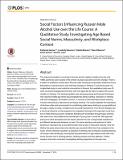Files in this item
Social factors influencing Russian male alcohol use over the life course : a qualitative study investigating age based social norms, masculinity, and workplace context
Item metadata
| dc.contributor.author | Keenan, Katherine | |
| dc.contributor.author | Saburova, Lyudmila | |
| dc.contributor.author | Bobrova, Natalia | |
| dc.contributor.author | Elbourne, Diana | |
| dc.contributor.author | Ashwin, Sarah | |
| dc.contributor.author | Leon, David A | |
| dc.date.accessioned | 2017-07-28T13:30:08Z | |
| dc.date.available | 2017-07-28T13:30:08Z | |
| dc.date.issued | 2015-11-17 | |
| dc.identifier | 250544803 | |
| dc.identifier | 744ca2fd-e561-47e4-be76-381df0110aec | |
| dc.identifier | 84956698061 | |
| dc.identifier.citation | Keenan , K , Saburova , L , Bobrova , N , Elbourne , D , Ashwin , S & Leon , D A 2015 , ' Social factors influencing Russian male alcohol use over the life course : a qualitative study investigating age based social norms, masculinity, and workplace context ' , PLoS One , vol. 10 , no. 11 , e0142993 . https://doi.org/10.1371/journal.pone.0142993 | en |
| dc.identifier.issn | 1932-6203 | |
| dc.identifier.other | RIS: 7 | |
| dc.identifier.other | ORCID: /0000-0002-9670-1607/work/35292660 | |
| dc.identifier.uri | https://hdl.handle.net/10023/11319 | |
| dc.description | The study was supported by an award from the Wellcome Trust to David A Leon. | en |
| dc.description.abstract | The massive fluctuations occurring in Russian alcohol-related mortality since the mid-1980s cannot be seen outside of the context of great social and economic change. There is a dearth of qualitative studies about Russian male drinking and especially needed are those that address social processes and individual changes in drinking. Conducted as part of a longitudinal study on men’s alcohol consumption in Izhevsk, this qualitative study uses 25 semi-structured biographical interviews with men aged 33–60 years to explore life course variation in drinking. The dominant pattern was decreasing binge and frequent drinking as men reached middle age which was precipitated by family building, reductions in drinking with work colleagues, and health concerns. A minority of men described chaotic drinking histories with periods of abstinence and heavy drinking. The results highlight the importance of the blue-collar work environment for conditioning male heavy drinking in young adulthood through a variety of social, normative and structural mechanisms. Post-Soviet changes had a structural influence on the propensity for workplace drinking but the important social function of male drinking sessions remained. Bonding with workmates through heavy drinking was seen as an unavoidable and essential part of young men’s social life. With age peer pressure to drink decreased and the need to perform the role of responsible breadwinner put different behavioural demands on men. For some resisting social pressure to drink became an important site of self-determination and a mark of masculine maturity. Over the lifetime the place where masculine identity was asserted shifted from the workplace to the home, which commonly resulted in a reduction in drinking. We contribute to existing theories of Russian male drinking by showing that the performance of age-related social roles influences Russian men’s drinking patterns, drinking contexts and their attitudes. Further research should be conducted investigating drinking trajectories in Russian men. | |
| dc.format.extent | 15 | |
| dc.format.extent | 272164 | |
| dc.language.iso | eng | |
| dc.relation.ispartof | PLoS One | en |
| dc.subject | HM Sociology | en |
| dc.subject | BF Psychology | en |
| dc.subject | NDAS | en |
| dc.subject | SDG 3 - Good Health and Well-being | en |
| dc.subject.lcc | HM | en |
| dc.subject.lcc | BF | en |
| dc.title | Social factors influencing Russian male alcohol use over the life course : a qualitative study investigating age based social norms, masculinity, and workplace context | en |
| dc.type | Journal article | en |
| dc.contributor.institution | University of St Andrews. Geography & Sustainable Development | en |
| dc.identifier.doi | https://doi.org/10.1371/journal.pone.0142993 | |
| dc.description.status | Peer reviewed | en |
| dc.identifier.url | http://journals.plos.org/plosone/article?id=10.1371/journal.pone.0142993#sec020 | en |
This item appears in the following Collection(s)
Items in the St Andrews Research Repository are protected by copyright, with all rights reserved, unless otherwise indicated.

